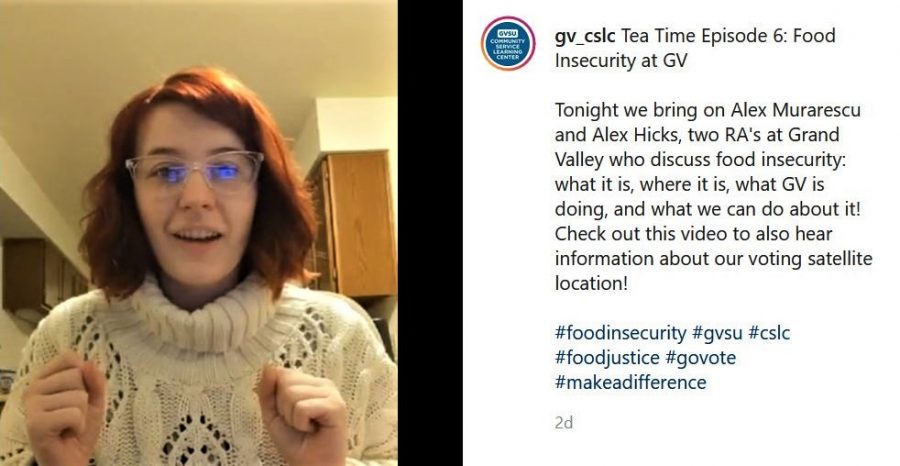CLSC discusses food insecurity with Tea Time
The Oct. 29 discussion was hosted by Civic Engagement Associate Carson McCready. (GVL/Katherine Arnold)
Nov 2, 2020
Every other week, Grand Valley State University’s Community Service Learning Center (CSLC) hosts a virtual dialogue event they call “Tea Time.” From the controversy around absentee ballots and mail to the challenges of voter suppression, Tea Time seeks to cover a variety of hot topics with this new event series.
“Tea Time is an informal, Instagram Live series produced by students, for students, about relevant topics that the GVSU community cares about as we approach this year’s election,” said Kayla Sosa, Executive Producer of Tea Time and CSLC staff member.
Their latest Tea Time feature was Oct. 29, discussing food insecurity at GVSU — what food security is, what it looks like on a university campus and what that means for the community. The host for this episode was Carson McCready, a junior majoring in communications. This live interview featured two speakers, the first being Alex Murarescu, a senior and third year Resident Assistant (RA) at the Holton Hooker Living Center.
Last year, her friend, who was involved in Student Senate, put forth an official resolution on the topic last year. The legislative call-to-action for GVSU planned that by fall 2020, an income-based meal plan would be available for students. While COVID-19 has complicated the development of this idea, there is still hope that this change will be implemented sometime in the future.
“Out of that initial charge of the university came the Food Insecurity Task Force,” Murarescu said. “Through that task force, a survey was sent out to the entire GVSU community about food insecurity last fall to learn more about what insecurity in areas of food and housing in the community.”
From that survey, they were able to learn that 32% of students at GVSU suffer from food insecurity, while 51% of all students suffer from a basic insecurity in general — whether that be food, housing or other daily necessities. Murarescu explained how in addition to the effects that nutrition has on our ability to perform academically, an improper diet can result in serious delays to cognition and growth.
“Food is one of the basic human needs, and if that is denied to you, it becomes so much harder to succeed,” Murarescu said. “Some people will never recover from the effects that this has on you.”
The second speaker was Alex Hicks, a junior and second year RA at Grand Valley Apartments.
“A lot of people think that food insecurity means that you need food stamps to get food, which isn’t the full picture,” Hicks said. “If you struggle to eat at all or struggle to afford daily nutritious meals outside of just any food, that is being food insecure.”
One part of their discussion focused on the stereotype of “broke college students,” those surviving off of ramen because they can’t afford anything else.
“This stereotype is a lot more problematic than we acknowledge most of the time,” Hicks said. “Because of this, I would argue that food insecurity exists everywhere on college campuses.”
Food availability is another key concern, especially during a pandemic. For students like Hicks living on the South end of campus, the accessibility to food is complicated. While the Connection is open, they only offer sandwiches and the hot plate option. The next closest food is Panda Express and Subway, but with their limited hours and the basement of the Kirkhof Center being closed, many students have to travel to Kleiner in order to access meals that are more nutritious and conscious of vegan, vegetarian, gluten-free and lactose-free options. This doesn’t include the downtown meal plan options, which close at 4 p.m. and are similarly limited.
“One problem with campus dining, outside of proximity, is that for dietary restrictions they take away but don’t always replace,” said Hicks.
For example, if a meal offered by campus dining had meat in it, the “vegetarian” version of that meal would often remove the meat without another protein substitute added in. In general, substitutions typically have smaller portions than other products, can be hard to locate on campus and can result in an up-charge for students.
“And if you aren’t near a dining location… the next closest thing is a vending machine,” said McCready.
What is GVSU currently doing to combat food insecurity? Replenish, an organization on campus that supplies food to students, has been helping students for a few years now. Hicks explained that Replenish does a good job of working with the little that they are given, but there are other options being discussed to support those efforts.
“One thing proposed last year was a Laker Meal-Exchange program,” Hicks said, speaking on a system where unused meals in other student’s weekly meal plans could go towards students who needed them. “I haven’t heard anything about it recently, but the system would allow students to donate their meals or to ask for meals.”
The topics discussed in this article are only part of the conversation. To listen to the full recording or past recordings, head over to the CSLC Instagram page at @gv_cslc, where they have recorded all of their past Tea Time events. On Nov. 5, CSLC will be hosting a special edition of Tea Time where they discuss the results of the presidential election.
























